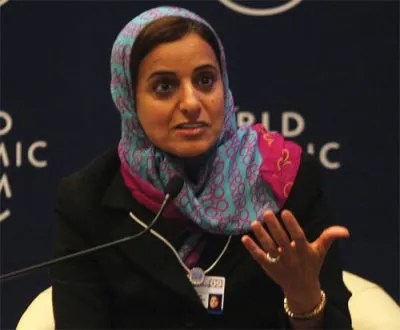Women in Business — Is the Revolution on the Horizon?
For the informed, the answer was simple. She is Sheikha Lubna Al Qassimi, the minister of foreign trade for the UAE and by my calculations, the most powerful woman in the Middle East. (Truth be told, Forbes beat me to this assessment in their 2010 list of the world’s 100 most powerful women.) It wasn’t always this way for Al Qassimi. The California State College graduate and self-described computer geek arrived at Dubai Ports World as the sole female software designer. Sleepless nights driven by intense anxieties fueled her fires as she rose in stature as the modernizing force at the Dubai Port Authority.
“I was the first senior woman coming on board, and it was a tough challenge,” she says. “I would have to explain to executives how I was going to deliver, and there was always a question: How much can I rely on you? As many of us enter new workplaces and new regions, we have to build credibility that stretches across gender and social lines.”
In her case, Al Qassimi learned everything there was to know about the maritime industry, its complex terminology and how to present IT projects to senior executives in a way that showed the value to the business. When they finally gave her a chance, she delivered an IT system that supported the day-to-day operation of the company’s ports.
“For women to be accepted, they have to be trusted, and they have to be overachievers,” she says. “The bottom line is whether you can deliver dollars (or dirhams). You have to prove that it doesn’t matter gender-wise who sits there.”
Effectively, she built the needed trust of her peers and established her credibility. She was the trailblazer that began to crumble the so-called “cement ceiling” that held many women in subordinate roles well below their capabilities. Al Qassimi is no longer an anomaly. She is one of a small but noteworthy assembly of women who are challenging expectations and making a difference in Lebanon, Jordan, and the Gulf States. That says more than you think.
In the Middle East, where failure is the ultimate black mark, and speaking of your fear of failure is worse, women have seldom been given the opportunity to excel in business, where female entrepreneurship rates are the world’s lowest.
Lesson be learned: Learning the language of business, mentoring, networking, accessing capital and overcoming personal setbacks are the backbone of making it in the region.
Other regional leaders are bucking the system, too. Most important is American-educated Princess Ameerah Al-Taweel of Saudi Arabia. There’s been a long-standing cry to give women the right to drive. Almost as if the world’s citizens can say, “Look, Saudi women have equal rights: they can drive!” The Jeep-driving princess eschews the law that prohibits women from driving, pushing for integrated work facilities, and she stands as a primary reason women were granted the right to vote and run in municipal elections. Well, that’s a start.
While many underestimate women, few women underestimate the challenge of gaining equal footings. Just under 30 percent of the adult female Middle Eastern population is economically active – again the lowest in the world – and the majority of these women are clustered in low-level positions. According to the World Bank, dissimilar guidelines for men and women exist in all 14 economies in the Middle East and North Africa, and under 20 percent of firms in the region employ a high-level female manager. Laughably, the Freedom House, a U.S. organization that promotes human rights, cites “cultural perceptions that women are less capable, more irrational and better suited for domestic responsibilities.”
The cultural bias is especially hard for women who want to run an enterprise outside the family business. (One survey found women as principal owners in just 13 percent of firms, less than half the world average.)
“Usually families are protective of women. They don’t want you to be exposed, to take the brunt of the market forces,” says Egyptian entrepreneur Shereen Allam, who also runs an association to foster female professional development.
As executives and owners of businesses ranging from manufacturing to digital services, the more than 200 women who have gathered to hear Al Qassimi and others push against that tide, are building network “hubs” in Libya and Lebanon, the Emirates and Egypt, Morocco and Tunisia – 10 countries in all.
They arrived at a Dubai hotel ballroom wearing running shoes under embroidered abayas, designer heels under slim skirts, some covered with silk head-scarves and others in salonfresh hair. One young woman wore a Beatles T-shirt; another sported a small tattoo. They sipped dark coffee and mint lemonade as they swapped business cards and strategies for branding and media imaging, finding angel capital and accessing government contracts.
Still, talking about advancing the status of women remains a delicate exercise. The UAE, among the most tolerant in the region, followed in Egypt’s footsteps last month by shutting down the local office of the National Democratic Institute, a U.S. group whose mission is to promote democracy, as well as Gallup’s polling operation – a sign of worry about the Arab Spring uprising spreading into its borders. Last fall, the government asked the organizers of an International Bar Association conference to revise a panel on women and Islam.
And, in the short term, economic fallout from the political tumult has taken a toll on working women, though Egypt’s Allam says she worries less about entrepreneurs than salaried employees.
“You’re doing it with your own money and at your own risk,” she notes. “I worry about the women who work for government or businesses that aren’t multinationals. There’s a view that if there’s so much unemployment, the few jobs we have should be given to men, so women will be laid off.”
Remarkably, women outpace men in education―as they are 67 percent of university graduates in Kuwait, 63 percent in Qatar and 57 percent in Saudi Arabia. Freedom House notes that women are becoming more visible in public life and in business. Bahrain, Kuwait and Qatar dropped laws requiring women to get a guardian’s permission for a passport; Saudi Arabia now allows women to study law and check into hotels alone, and multinationals like GE are hiring small numbers of Saudi women.
If anything, the lesson of Arab Spring is that the Middle East is not immune to cultural change. The women at the forefront see reform coming in fits and starts—but they’re betting it will come.































